Ouida - Wisdom, Wit, and Pathos of Ouida
Здесь есть возможность читать онлайн «Ouida - Wisdom, Wit, and Pathos of Ouida» — ознакомительный отрывок электронной книги совершенно бесплатно, а после прочтения отрывка купить полную версию. В некоторых случаях можно слушать аудио, скачать через торрент в формате fb2 и присутствует краткое содержание. Жанр: foreign_prose, literature_19, foreign_antique, на английском языке. Описание произведения, (предисловие) а так же отзывы посетителей доступны на портале библиотеки ЛибКат.
- Название:Wisdom, Wit, and Pathos of Ouida
- Автор:
- Жанр:
- Год:неизвестен
- ISBN:нет данных
- Рейтинг книги:4 / 5. Голосов: 1
-
Избранное:Добавить в избранное
- Отзывы:
-
Ваша оценка:
- 80
- 1
- 2
- 3
- 4
- 5
Wisdom, Wit, and Pathos of Ouida: краткое содержание, описание и аннотация
Предлагаем к чтению аннотацию, описание, краткое содержание или предисловие (зависит от того, что написал сам автор книги «Wisdom, Wit, and Pathos of Ouida»). Если вы не нашли необходимую информацию о книге — напишите в комментариях, мы постараемся отыскать её.
Wisdom, Wit, and Pathos of Ouida — читать онлайн ознакомительный отрывок
Ниже представлен текст книги, разбитый по страницам. Система сохранения места последней прочитанной страницы, позволяет с удобством читать онлайн бесплатно книгу «Wisdom, Wit, and Pathos of Ouida», без необходимости каждый раз заново искать на чём Вы остановились. Поставьте закладку, и сможете в любой момент перейти на страницу, на которой закончили чтение.
Интервал:
Закладка:
For even as it was with the divinity of Delos, so is it likewise with the genius of a man, which, being born of a god, yet is bound as a slave to the grindstone. Since even as Hermes mocked the Lord of the Unerring Bow, so is genius mocked of the world, when it has bartered the herds, and the grain, and the rod that metes wealth, for the seven chords that no ear, dully mortal, can hear.
And as he looked upon this symbol of his life, the captivity and the calamity, the strength and the slavery of his existence overcame him; and for the first hour since he had been born of a woman Arslàn buried his face in his hands and wept.
He could bend great thoughts to take the shapes that he chose, as the chained god in Pheræ bound the strong kings of the desert and forest to carry his yoke; yet, like the god, he likewise stood fettered to the mill to grind for bread.
One evening, a little later, he met her in the fields on the same spot where Marcellin first had seen her as a child amongst the scarlet blaze of the poppies.
The lands were all yellow with saffron and emerald with the young corn; she balanced on her head a great brass jar; the red girdle glowed about her waist as she moved: the wind stirred the folds of her garments; her feet were buried in the shining grass; clouds tawny and purple were behind her; she looked like some Moorish phantom seen in a dream under a sky of Spain.
He paused and gazed at her with eyes half content, half cold.
She was of a beauty so uncommon, so strange, and all that was his for his art:—a great artist, whether in words, in melody, or in colour, is always cruel, or at the least seems so, for all things that live under the sun are to him created only to minister to his one inexorable passion.
Art is so vast, and human life is so little. It is to him only supremely just that the insect of an hour should be sacrificed to the infinite and eternal truth which must endure until the heavens themselves shall wither as a scroll that is held in a flame. It might have seemed to Arslàn base to turn her ignorance, and submission to his will, for the gratification of his amorous passions; but to make these serve the art to which he had himself abandoned every earthly good was in his sight justified, as the death agonies of the youth whom they decked with roses and slew in sacrifice to the sun, were in the sight of the Mexican nation.
The youth whom the Mexicans slew, on the high hill of the city, with his face to the west, was always the choicest and the noblest of all the opening flower of their manhood: for it was his fate to be called to enter into the realms of eternal light, and to dwell face to face with the unbearable brightness without whose rays the universe would have perished frozen in perpetual night. So the artist, who is true to his art, regards every human sacrifice that he renders up to it; how can he feel pity for a thing which perishes to feed a flame that he deems the life of the world?
The steel that he draws out from the severed heart of his victim he is ready to plunge into his own vitals: no other religion can vaunt as much of its priests.
"What are you thinking of to-night?" he asked her where she came through the fields by the course of a little flower-sown brook, fringed with tall bulrushes and waving willow-stems.
She lifted her eyelids with a dreamy and wistful regard.
"I was thinking—I wonder what the reed felt that you told me of—the one reed that a god chose from all its millions by the waterside and cut down to make into a flute."
"Ah?—you see there are no reeds that make music now-a-days; the reeds are only good to be woven into kreels for the fruits and the fish of the market."
"That is not the fault of the reeds?"
"Not that I know; it is the fault of men, most likely, who find the chink of coin in barter sweeter music than the song of the syrinx. But what do you think the reed felt then?—pain to be so sharply severed from its fellows?"
"No—or the god would not have chosen it."
"What then?"
A troubled sigh parted her lips; these old fables were fairest truths to her, and gave a grace to every humblest thing that the sun shone on, or the waters begat from their foam, or the winds blew with their breath into the little life of a day.
"I was trying to think. But I cannot be sure. These reeds have forgotten. They have lost their soul. They want nothing but to feed among the sand and the mud, and grow in millions together, and shelter the toads and the newts,—there is not a note of music in them all—except when the wind rises and makes them sigh, and then they remember that long, long-ago the breath of a great god was in them."
Arslàn looked at her where she stood; her eyes resting on the reeds, and the brook at her feet; the crimson heat of the evening all about her, on the brazen amphora, on the red girdle on her loins, on the thoughtful parted lips, on the proud bent brows above which a golden butterfly floated as above the brows of Psyche.
He smiled; the smile that was so cold to her.
"Look: away over the fields, there comes a peasant with a sickle; he comes to mow down the reeds to make a bed for his cattle. If he heard you, he would think you mad."
"They have thought me many things worse. What matter?"
"Nothing at all;—that I know. But you seem to envy that reed—so long ago—that was chosen?"
"Who would not?"
"Are you so sure? The life of the reed was always pleasant;—dancing there in the light, playing with the shadows, blowing in the winds; with the cool waters all about it all day long, and the yellow daffodils and the blue bell-flowers for its brethren."
"Nay;—how do you know?"
Her voice was low, and thrilled with a curious eager pain.
"How do you know?" she murmured. "Rather,—it was born in the sands, amongst the stones, of the chance winds, of the stray germs,—no one asking, no one heeding, brought by a sunbeam, spat out by a toad—no one caring where it dropped. Rather,—it grew there by the river, and such millions of reeds grew with it, that neither waters nor winds could care for a thing so common and worthless, but the very snakes twisting in and out despised it, and thrust the arrows of their tongues through it in scorn. And then—I think I see!—the great god walked by the edge of the river, and he mused on a gift to give man, on a joy that should be a joy on the earth for ever; and he passed by the lily white as snow, by the thyme that fed the bees, by the gold heart in the arum flower, by the orange flame of the tall sandrush, by all the great water-blossoms which the sun kissed, and the swallows loved, and he came to the one little reed pierced with the snakes' tongues, and all alone amidst millions. Then he took it up, and cut it to the root, and killed it;—killed it as a reed,—but breathed into it a song audible and beautiful to all the ears of men. Was that death to the reed?—or life? Would a thousand summers of life by the waterside have been worth that one thrill of song when a god first spoke through it?"
Her face lightened with a radiance to which the passion of her words was pale and poor; the vibrations of her voice grew sonorous and changing as the sounds of music itself; her eyes beamed through unshed tears as planets through the rain.
Of all the forms with which he had peopled its loneliness, these had the most profound influence on her in their fair, passionless, majestic beauty, in which it seemed to her that the man who had forgotten them had repeated his own likeness. For they were all alike, yet unlike; of the same form and feature, yet different even in their strong resemblance, like elder and younger brethren who hold a close companionship. For Hypnos was still but a boy with his blue-veined eyelids closed, and his mouth rosy and parted like that of a slumbering child, and above his golden head a star rose in the purple night. Oneiros standing next was a youth whose eyes smiled as though they beheld visions that were welcome to him; in his hand, amongst the white roses, he held a black wand of sorcery, and around his bended head there hovered a dim silvery nimbus. Thanatos alone was a man fully grown; and on his calm and colourless face there were blended an unutterable sadness, and an unspeakable peace; his eyes were fathomless, far-reaching, heavy laden with thought, as though they had seen at once the heights of heaven and the depths of hell; and he, having thus seen, and knowing all things, had learned that there was but one good possible in all the universe,—that one gift which his touch gave, and which men in their blindness shuddered from and cursed. And above him and around him there was a great darkness.
Читать дальшеИнтервал:
Закладка:
Похожие книги на «Wisdom, Wit, and Pathos of Ouida»
Представляем Вашему вниманию похожие книги на «Wisdom, Wit, and Pathos of Ouida» списком для выбора. Мы отобрали схожую по названию и смыслу литературу в надежде предоставить читателям больше вариантов отыскать новые, интересные, ещё непрочитанные произведения.
Обсуждение, отзывы о книге «Wisdom, Wit, and Pathos of Ouida» и просто собственные мнения читателей. Оставьте ваши комментарии, напишите, что Вы думаете о произведении, его смысле или главных героях. Укажите что конкретно понравилось, а что нет, и почему Вы так считаете.












